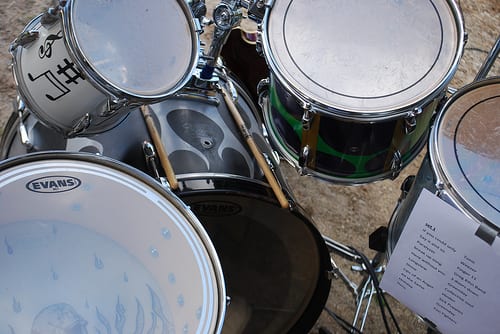 If you want to learn how to drum, finding a great teacher or mentor is key – someone who can offer you advice, tips and encouragement as you work on your skills. Read on as Brooklyn, NY drum teacher Dylan M. shares the advice that influenced him early on…
If you want to learn how to drum, finding a great teacher or mentor is key – someone who can offer you advice, tips and encouragement as you work on your skills. Read on as Brooklyn, NY drum teacher Dylan M. shares the advice that influenced him early on…
It was during the CMJ music festival of 2010 in New York City when I got the most valuable piece of advice of my entire career to date, and it came from one of my favorite drummers, Jojo Mayer, on a night that almost didn’t happen. I got called to play a last-minute, late-night gig at a venue down off of Bowery St., after which I was packing up and noticed a familiar face walking toward the stairwell. Taking no chances, I dropped my gear and ran toward this mystery figure. Sure enough, it was Jojo, and I couldn’t contain my excitement. Knowing that I was probably being pretty annoying, and he probably had somewhere to be, I simply asked, “If you could just give me one piece of advice, what would it be?”
He responded after a few moments of silence: “Be a musician, not a drummer.” We shook hands and parted ways, leaving me in an absolute state of bewilderment. It wasn’t until later that night that the density of this simple phrase really sank in. Ever since, I’ve been dissecting and deconstructing these six words, trying to find their truest meaning and simplest applications. Within are some of the most basic and crucial lessons for any musician of any skill level. Taking these to heart, I’ve crafted six good practices for every drummer to consider. Here are the first three:
Listen
To play music is to listen. We listen, we answer. What we decide to play is a result of digesting the music around us. I cannot punctuate the importance this. Dennis Chambers has famously said that many of his rehearsals have been spent simply sitting in a chair, listening to albums for hours without saying a word. When we allow ourselves to “hear” the bigger picture, we activate both sides of our brain, opening up the cognitive doors to expression and creativity, out of which great music can be formulated.
Express Discipline
As the drummer you must not forget that your singular job is being the timekeeper. Too often we hear players shredding some over the top licks in contexts that could probably get by with just a simple backbeat. I know, it’s fun to show off what you’ve got on stage, but this is not only a lack of expressing discipline, it also can be displeasing to the ear. A good musician knows when the time is right to let loose on the kit and when playing in the pocket is warranted. These are the drummers that get called back for the gig.
Approach
Here’s where perhaps the above two ideals can be put to the test. Approach is all about what is needed from the drummer under a particular context, a combination of really hearing what is happening and knowing how to execute. There is no “copy and paste” option within this practice, as every situation is different and calls for its own flavor to be applied. Approach should be fun. It can allow a player to reach out to the limits of their musical capacities and create unexpected rhythmic solutions from within.
Stay tuned for the part 2 next week!
Like this post? Don’t miss out on any of our tips, tricks and advice! Sign up for a free email subscription and receive our updates!
You might also like…
– Overcoming Drummer Stereotypes – Part 1
– Overcoming Drummer Stereotypes – Part 2
– How to Tackle Difficult Styles, Patterns and Beats
 Dylan M. teaches drum and percussion lessons to students of all ages in Brooklyn, NY. His specialties include stick control, syncopation, brush work, independence and linear exercises and technique, covering many styles including jazz, funk, rock and R&B. Learn more about Dylan, or search for a teacher near you!
Dylan M. teaches drum and percussion lessons to students of all ages in Brooklyn, NY. His specialties include stick control, syncopation, brush work, independence and linear exercises and technique, covering many styles including jazz, funk, rock and R&B. Learn more about Dylan, or search for a teacher near you!
Photo by Paintball Photos
Suzy S.
